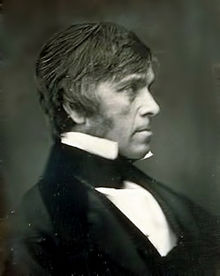Yesterday I went back to the Carlyle Letters Online for little break in the work day. I decided to do some reading in the letters of the period when Carlyle was preparing his German Romance: Specimens of Its Chief Authors, with biographical and critical notes, 4 Vols., which was published in early 1827. I began with a few letters in 1825 where Carlyle wrote to someone about his research and early writing, and skipped through the letters for the next two years, judging from the index to which correspondents he was likely to write about this. I ended with several letters to the publisher in the month Carlyle finished the writing and was reviewing proofs of the early volumes.
Today I decided to go back further in time, to do the same thing in the couple of years leading up to Carlyle’s first full length book, a translation of Goethe’s Wilhelm Meister’s Apprenticeship. That was published in 1824, so I began in 1822, again just skimming through the list of letters to his different correspondents. In February 1822 I saw a letter that might have something about it, in its earliest gestation, and so pulled it up.
It did not have anything about the Wilhelm Meister, but I found this buried in it. Nor do I in the smallest abandon the hope that future days will be calmer than those that have passed and are passing over us. Depend upon it, my good friend, there is a time coming, when tho' we may not be great men, we shall be placid ones; when, having mended by much toil what is capable of mending in our condition, and resigned ourselves to endure with much patience what in it is incapable of mending, we shall meet together like toilworn way-farers descending the mountain cheerily and smoothly which they climbed with danger and distress. “We will laugh and sing and tell old tales” and forget that our lot has been hard, when we think that our hearts have been firm, and our conduct true and honest to the last. This should console us whatever weather it is with us: the task is brief; and great is the reward of doing it well.
Given all that, I admire Carlyle’s confidence. “Future days will be calmer…tho’ we may not be great men, we shall be placid ones…toilworn way-farers descending the mountain cheerily and smoothly which they climbed with danger and distress.”
I don't know for sure that Carlyle ever found those calmer days. At least, if you believe the complaints in his letter, he didn't. He wrote how he was a slacker when in fact he worked himself into ill health. He complained about every book he wrote, from the moment of conception till it was born to the world. As I wrote in a previous post, it seems that for every book he would describe it as a sorry enterprise, one he was anxious to be rid of.
I have to take and consider this advice, however, whether Carlyle actually achieved it or not. I'm still comining that mountain, not always cheerily. The cost in time and mental energy are sometimes almost exhausting. I go from completing this post to work on China Tour, hoping to get my 1,000 words written tonight—even though it's 8:45 p.m. already.
So, I will say along with Carlyle, the tast if breif; and great is the reward of doing it well. Oh, God, help me to embrace this and carry it through.
I don't know for sure that Carlyle ever found those calmer days. At least, if you believe the complaints in his letter, he didn't. He wrote how he was a slacker when in fact he worked himself into ill health. He complained about every book he wrote, from the moment of conception till it was born to the world. As I wrote in a previous post, it seems that for every book he would describe it as a sorry enterprise, one he was anxious to be rid of.
I have to take and consider this advice, however, whether Carlyle actually achieved it or not. I'm still comining that mountain, not always cheerily. The cost in time and mental energy are sometimes almost exhausting. I go from completing this post to work on China Tour, hoping to get my 1,000 words written tonight—even though it's 8:45 p.m. already.
So, I will say along with Carlyle, the tast if breif; and great is the reward of doing it well. Oh, God, help me to embrace this and carry it through.


1 comment:
I haven't read Thomas Carlyle (At least I don't remember doing so.); but he wrote one of my favorite and most motivating quotes: "Our main business is not to see what lies dimly at a distance, but to do what lies clearly at hand."
Letters are interesting to read. You get to learn a not about the writer.
Post a Comment